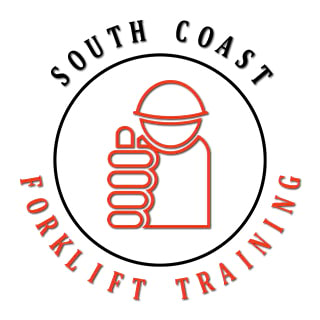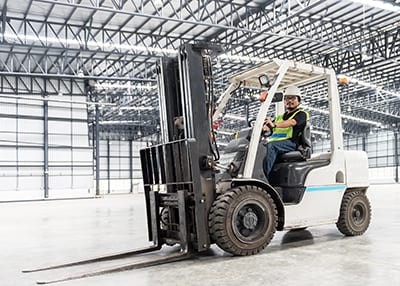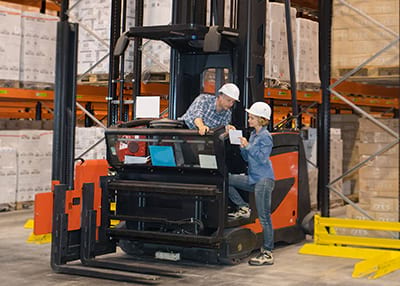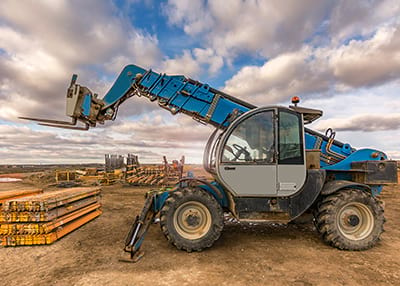Reach Truck Training
Home / Forklift Courses / Reach Truck Training
Reach truck training
Become fully licensed to operate
All our reach truck training courses contain theory lessons in a classroom and practical work using the reach forklift truck. These courses follow the Health and Safety Commission's approved code of practice and guidance. Meaning you, as an employer, meet your legal obligations to make sure all reach truck drivers receive adequate training.
At South Coast Forklift Training, we understand that everyone prefers a different learning style. Therefore, our courses use a variety of techniques to suit all learners. We use forklift models, videos, PowerPoint, worksheets and handouts to keep everyone interested. Each lesson is then finished with some questions to ensure all information is understood.
The theory work builds gradually allowing time to absorb the information before moving to the next stage. Practical lessons are demonstrated, then trainees are given adequate time to practise under close supervision.
Each course culminates with three stages of testing:
- A theory test – consisting of 25 questions
- Pre-use inspection test
- Practical skills test involving various manoeuvres completed in a safe manner
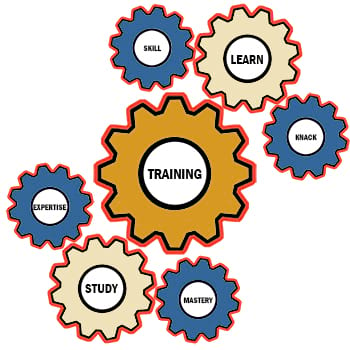
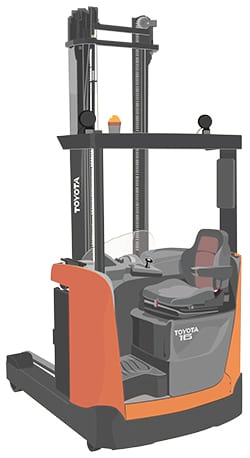
The reach truck
Height, rather than weight
A reach truck or reach forklift truck takes its name from the fact it can extend its mast forwards, allowing the forks to enter a racking system to pick up and deposit loads. The operator mounts the vehicle from the back and sits at right angles to the forks.
Reach trucks are a common sight in warehouses throughout the world. Their compact design delivers great manoeuvrability, making them the perfect choice where space is limited. Their low ground clearance and small wheels mean they are traditionally used inside a warehouse. However, models designed for outside use are becoming more common.
Their lifting capacity is between one and three tonnes. But, they are usually chosen when height, rather than weight is the main purpose of use. The larger models can lift to a height of more than thirteen metres.
They are powered by electricity, with batteries. These are located in the bulkhead between the driver and the forks. Charging is from a separate charging cabinet.
Many of these trucks have moved from traditional lead-acid batteries to lithium-ion technology. These modern batteries charge faster, require zero maintenance and do not emit harmful gases when charging.
REACH TRUCK TRAINING FROM A COMPANY THAT CARES
Reach Truck Course Specifications
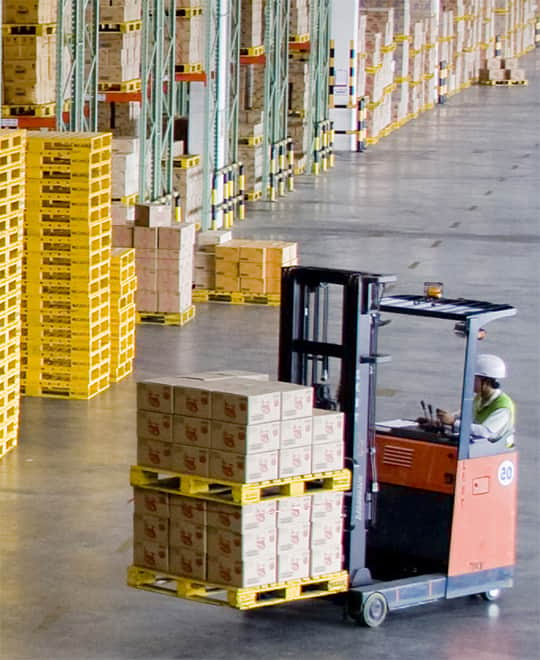
Machine:
Reach (Rider)
Category:
D1, D2 or D3
Specification:
3-8 metre lift (D1), over 8 metre lift (D2) or stand on (D3)
Accrediting Body:
Independent Training Standards Scheme & Register (ITSSAR)
Ratio:
3 : 1 : 1 (3 operators, 1 instructor, 1 machine)
Duration:
Novice - 1 operator = 3 days, 2 operators = 4 days, 3 operators = 5 days
Experienced - 1 operator = 2 days, 2 operators = 2 days, 3 operators = 3 days
Safety Refresher - 1 operator = 1 day, 2 operators = 1 day, 3 operators = 1 day
Conversion - contact us
Cost:
Contact us
COURSES DESIGNED TO DELIVER RESULTS
Reach Truck Course Breakdown
The following list is the elements that make up a novice reach truck course. For experienced operators, safety refresher and conversion courses the list would be shorter.
- Course induction
- The need and reasons for training and statutory requirements (HASAWA 1974 etc.)
- Introduction to equipment/control familiarisation/principles of operation
- Identification/use/adjustment of attachments in pre-determined positions including forks
- Recommended mount and dismount
- Introduction to motive, steering controls and practice
- Basic steering exercises – simple courses
- Advanced steering exercises – figure of 8/chicane/90° approaches
- Battery charging procedures/maintenance
- Operator safety code and relevant handout
- Daily pre-use inspections/refuelling procedures
- Engineering principles/rated capacity/stability
- Simple hydraulics (theory)
- Introduction to hydraulic controls, handling empty pallets low-level
- Load types/handling and weight assessment
- Stacking/de-stacking at low, medium and high levels on industrial racking*
- Stacking/de-stacking at low, medium and high levels bulk stacks*
- Stacking/de-stacking at low, medium and high levels cup post pallets*
- Manoeuvring with loads/ramps and inclines/handling awkward loads*
- Relevant safety film
- Vehicle loading and unloading (theory)*
- Vehicle loading and unloading (practical)*
- Multi-choice theory test
- Pre-use inspection test
- Practical skills test
* To be covered where relevant to operation or facilities permit
WHATEVER YOUR LEVEL, WE HAVE YOU COVERED
From in-depth beginners to safety refresher courses
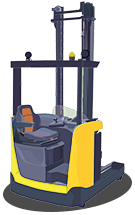
ITSSAR accredited reach truck training
All courses are ITSSAR accredited and therefore recognised throughtout your industry.

Novice reach truck training
For trainees with little or no previous experience operating a reach truck.

Experienced reach truck training
Where candidates have relevant, recent experience but, have not received any kind of approved training.

Reach truck refresher training
Periodic reach truck refresher training is for experienced operators who hold an accredited certificate.

Reach truck conversion training
Where operators already hold a forklift certificate on a similar machine and wish to qualify on a reach truck.
Delivering the best for your buisiness
Our courses are designed to achieve results
On-site reach truck courses
Every reach truck course we deliver is carried out on our customer’s premises. This gives trainees the advantage of being trained and tested on a machine that is already known to them. Therefore, eliminating the need for them to re-learn on another truck after initial training. On successful completion of this reach truck course, operators will know how to use these machines safely and efficiently.
We are happy to offer bespoke training programmes to meet your individual business requirements. We will always work around your needs and environment, to cause minimal disruption.
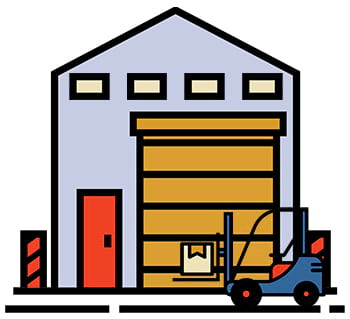
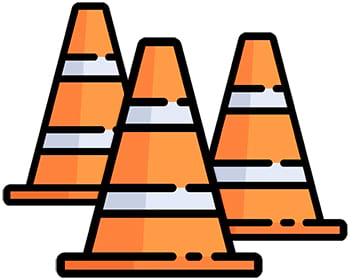
Facilities required
Firstly, and most importantly, to carry out your forklift training, we will need the use of your reach truck. Also, an area where we will not be disturbed, with ample space to carry out basic manoeuvres and testing. Pallets and realistic loads appropriate to your business are useful - the instructor will bring a selection of traffic cones. For the theory lessons, we need sufficient space for the instructor and the trainees to work. A small office with a table, chairs and power will suffice.
All forklift operators are required to wear safety boots and any other personal protective equipment as per the company's internal risk assessments. We supply hi-visibility vests.
If unsure about any of the above, contact us to discuss.
Reach truck licence certificates
On completion of this reach truck training, drivers are fully licensed to operate this category of truck. The qualification is nationally recognised and accepted throughout the industry.
They will also receive the following:
- An A4 ITSSAR approved reach truck certificate of basic training*
- A plastic photo identification card*
- A written assessment of strengths and weaknesses*
Additionally, operators are entered or edited onto ITSSAR’s TOPS (Trained Operator Passport Scheme) database for future reference.
*There is no additional charge for these

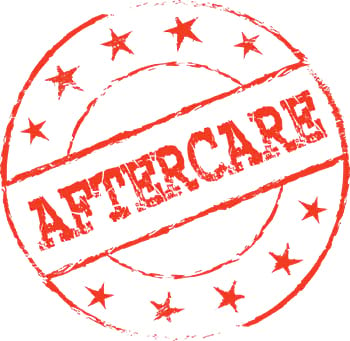
Five-star aftercare
Our service doesn't end with your training. At South Coast Forklift Training, we pride ourselves on our aftercare. It is what sets us apart from the competition and one of the many reasons our clients return to us. If you need us we are always here to answer any questions and offer advice.
In addition to this, after completing our training courses, clients receive:
- Advance warning when refresher training is due
- All relevant Health and Safety documentation
- Refuelling/recharging poster
- Seven-day pre-use inspection checklist
- An authorisation to operate lift trucks form
- Employer's training record form
APPROVED FORKLIFT LICENCES AND CERTIFICATES
Other Accredited Training Courses
Counterbalance Training
The counterbalance forklift is what most people think of when talking about forklift trucks. They are by far the most common fork truck in use in the world today. Their versatility means they are useful both inside and outside.
VNA Training
A VNA truck can fit into an aisle that is only a few centimetres wider than the truck. They are guided in these narrow spaces by either wire or rails. Their usual rated capacity is 1-1.6 tonnes with some models able to lift in excess of 15 metres.
Telehandler Training
No building site or farm is complete without a rough terrain, telescopic truck. With large tyres and high ground clearance there aren't many locations they can't work in. Some come equipped with legs for increased stability.
No wonder our clients keep coming back
Feedback from our trainees

"Having the instructor be encouraging while learning gives you confidence that you are achieving something – even the theory was engaging."
JK, Portsmouth, Hampshire

"Everything was very well explained. I enjoyed the theory as to how the truck works and should be driven."
TK, Lymington, Hampshire

"Fantastic instructor. Cannot recommend Clinton enough for his quality delivery of training, and his patience to persist in helping iron out errors 10/10."
TB, Segensworth, Fareham, Hampshire
Health & Safety Executive's Approved Code of Practice - Rider-Operated Lift Trucks
Obligation to provide basic training - Employers should not allow anyone to operate, even on a very occasional basis a lift truck until they have satisfactorily completed basic training and testing
